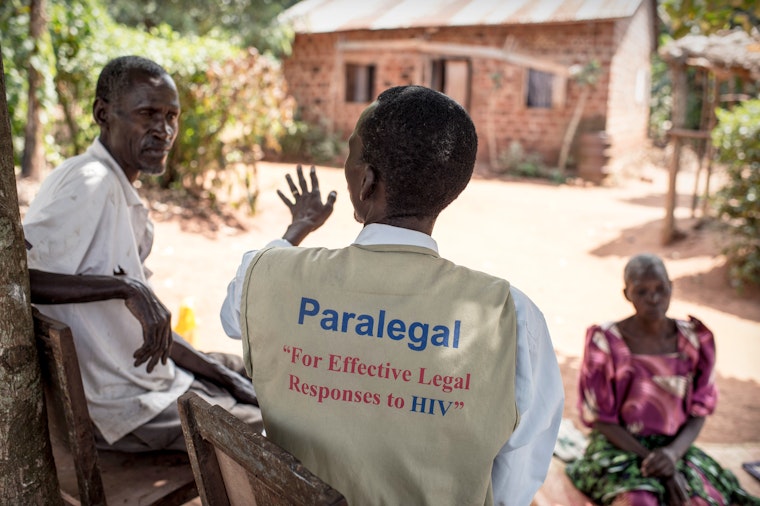Agenda 2030: Recognition for the Role of Justice and Governance in Sustainable Development
By Aidan Harris

Heads of state and government will gather at the United Nations in New York later this month for a three-day summit at which they will endorse a document that UN Secretary General Ban Ki-moon hopes will herald “an historic turning point for our world.”
The document, Transforming Our World: The 2030 Agenda for Sustainable Development, represents the most comprehensive vision for the future of global development yet conceived, negotiated and agreed upon after the most ambitious consultation process ever undertaken by the world body. In Mr. Ban’s view this is “the people’s agenda, a plan of action for ending poverty in all its dimensions, irreversibly, everywhere, and leaving no one behind.”
The Millennium Development Goals (MDGs) first articulated an agreed-upon development agenda for all countries to follow 15 years ago. But the MDGs, now replaced by the 2030 Agenda, were limited in scope and ambition; while much progress has been made towards their achievement, there are considerable gaps that they have not addressed.
One of the main criticisms of the MDGs has been their inability to reach those most in need of assistance. While economic growth in China, India, and Brazil has lifted millions of people out of poverty, the very poorest people have not benefited.
The new 2030 Agenda aims to both complete the work of the MDGs and to tackle some of their failures: by including a range of new thematic areas to be addressed; by emphasizing the interrelated nature of causes of poverty and development outcomes; and by reviewing progress in numerous discrete demographic groups so that no one is left behind.
Since 2012, the Open Society Foundations have called for the new development agenda to include targets on justice and good governance, which are now largely embodied in Goal 16 of the 17 Sustainable Development Goals contained in the 2030 plan.
Through the work of our foundations around the world, we know the intrinsic link between fundamental rights and happy, healthy, prosperous, and stable societies. Goal 16 recognizes this link by including targets addressing corruption, tackling violence, promoting accountability and transparency, supporting legal identity, and calling for access to justice and information and the promotion of the rule of law at all levels. Moreover, the importance of equal access to justice and participatory and inclusive approaches to development are recognized throughout the agreement, in the framing preamble, and in the other goals, targets, and review mechanisms.
Despite the potentially transformative inclusion of governance and justice targets, there remain some serious concerns regarding the new agenda. Doubtless some countries will ignore some targets, through choice or lack of capacity, and focus on their own priority areas. Indeed, the widened scope of the new agenda, reflecting the broad consultative process that led to its creation, may also be a potential weakness. Can we really say we have prioritized 17 goals that include 169 separate targets?
Communication also remains a significant challenge: how can we bring this document to life so that it is understood and meaningful to people, particularly those who stand to gain the most through its implementation? The first step towards people benefiting from the new development agenda is making them aware of it.
Finally, the targets themselves lack quantification in many cases (despite some intense lobbying for the inclusion of numeric targets during the through-the-night final stages of the negotiations), meaning that the mechanisms for monitoring and reviewing progress will likely now become even more politicized as states try to agree on common standards of measurement.
Nevertheless, the new sustainable development agenda is a significant milestone to be celebrated. It provides a strong foundation for civil society to build on and take forward over the next 15 years. Whether or not it lives up to its bold ambition will depend on effective implementation. Member states and civil society must work together to devise effective implementation strategies that meet local needs, underpinned by comprehensive and open data that shows where strategies are working and where different approaches are required.
At the international level, states must quickly agree on robust global indicators of progress that can track achievements across the entire development agenda, and an inclusive and open mechanism for reviewing trends and sharing learned experiences. The 2030 Agenda for Sustainable Development is not perfect. But it is the best hope we now have for coordinating global efforts to end poverty, fight climate change, and share prosperity.
It sets out a bold call to action that seeks to not only reduce poverty but completely eradicate it, and declares that its mission will have failed unless all sections of society have benefited, declaring that “as we embark on this collective journey, we pledge that no one will be left behind.”
The challenge now will be ensuring effective national implementation—with government, business, and civil society working together—and robust and transparent mechanisms for reviewing progress. If we can do that, the world can go far beyond what has been achieved under the MDGs over the past 15 years.
Aidan Harris is a program officer for the Open Society Justice Initiative.